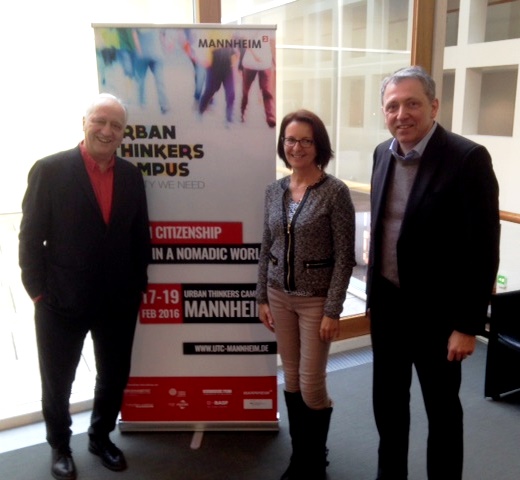The city of Mannheim hosts the Urban Thinkers Campus in cooperation with the UN-Habitat’s World Urban Campaign to find answers to the challenges posed by the refugee crisis
Berlin/Mannheim, 22 January 2016. “The refugee crisis poses the greatest challenge to German cities since the end of the Second World War“. This is the conviction stated today by the Lord Mayor of Mannheim, Dr Peter Kurz, at a press conference in Berlin. His city is currently host to roughly 11,000 refugees from Syria, Afghanistan, and other regions afflicted by civil war, accommodated in barracks formerly occupied by the US Army. This is making severe demands on the resources of the local authority – financially, logistically, and socially. If the refugee crisis is to be overcome, the influx of refugees must be significantly reduced already in the coming few months, and this requires the coordinated and combined endeavours of international, European, and national policy-makers. The 53-year-old SPD politician Dr Peter Kurz urges that every effort be made to combat the causes of flight by providing acute aid in the refugee camps and by restoring the national capabilities for action in the countries of the Middle East. He also appeals to the EU and the German Government to ensure that the refugees are fairly distributed among the member states and communities according to the solidarity principle. Mannheim’s Lord Mayor demands an immigration act and the securement of the external borders of the EU. In the event that immigration continues unrestricted at the present rate, he went on, this may jeopardize the statehood and rule of law. The communities must be given the necessary financial and organizational means to provide humane accommodation for the refugees.
“The real challenge, however, still lies before us,” Dr Kurz said: a large proportion of today’s refugees will be the fellow citizens of tomorrow. “The success of the processes to integrate these people will have a decisive impact on the social and economic future of our cities,” he said during the presentation of the agenda of the Urban Thinkers Campus “Urban Citizenship in a Nomadic World”, which will be taking place in the “Square City” of Mannheim from 17 thru 19 February 2016. This congress is being held in the context of a partnership with the World Urban Campaign of the UN-Habitat initiative, the programme run by the United Nations for the future development of human settlements. The thematic focus will be on the current international migration situation and its impact on life in cities.
The Mannheim Urban Thinkers Campus is one of a total of 28 events being held worldwide to establish a common contribution of non-governmental partners for the Habitat III Conference of the United Nations. It is the only such congress that will be held on this issue in Germany – and alongside Paris, Stockholm, Palermo, Barcelona, Geneva, and Alghero, one of seven in Europe. The results of the Mannheim congress will be directly integrated into the “New Urban Agenda” of the United Nations, which is scheduled to be passed in Quito/Ecuador in October 2016 and will serve as a political guideline for the development of urban settlements over the coming twenty years.
“In this role Mannheim is making a major contribution to the international debate on urbanization,” says the coordinator of the World Urban Campaign for the United Nations UN-Habitat programme, Christine Auclair. “‘Urban Citizenship in a Nomadic World’ is probably the most innovative approach selected by the Urban Thinkers Campuses”, Auclair continues. It will deal with the challenges of our urban world, a world that is subject to increasing change under global migration. “This is a process that will change the face of our cities all over the world.”
Mannheim will be making a highly intensive effort to deal with the consequences of migration. The work will focus on the identification of ways as to how cities can provide cultural and social services for all social strata and age groups of their citizens without excluding anyone from the process. The participants will shed light on the chances and risks of global migration for economic development, investigating how the immigrants can make their contribution to driving the economy forward. They will also deal with the ways in which cities can better tackle the problems posed by an ever-growing population, yet at the same time creating an urban identity and a sense of home, and the potential role of culture in serving as a key for values and sustainability.
Some 450 participants will be attending the congress in Mannheim, which looks forward to playing host to some of the most important urban planners of our time. Keynote speakers will include Benjamin Barber, formerly an advisor to the Ex-President of the United States, Bill Clinton; Ana Lisa Boni, Secretary General of EUROCITIES; and Charles Landry, the inventor of the “Creative Cities” concept. “By dealing with the issue of ‘Urban Citizenship in a Nomadic World’ Mannheim is making a vital and topically relevant contribution to the new cities agenda of the United Nations,” says Charles Landry, who will also be the moderator of the Campus. “Mannheim is one of the few German cities with long experience with the advantages and dilemmas of diversity, integration, and intercultural understanding, and wishes to share this experience with other cities all over the world.” As a measure to ensure that the refugees are not only the subject of the discussions but instead also actively shape them, it is also planned to organize a refugee parliament that will actively participate in tackling the current migration issues and concepts for the future.
“Mannheim has a wealth of experience in the integration of immigrants,” adds Lord Mayor Kurz. “We must put our basic values back into the focus of the process of communication,“ says Dr Kurz. Germany is an immigration country, he continues, and the people who want to live and work here must be given legal perspectives for immigration. Mannheim is well equipped to meet the challenges posed by integration. As a measure to foster the peaceful coexistence in the city, a declaration has already been passed that encourages the spirit of openness, tolerance, and communication; this declaration is now being amended to include further pledges. “This is exactly what people constantly call for in talk shows: a shared commitment to values and the rules on how we interact with each other,” says Dr Kurz.
Media Contact
Dr Stephan Wolf
Stadtmarketing Mannheim GmbH
+49 (0) 621 / 15667322
+49 (0) 160 / 90923822
s.wolf@stadtmarketing-mannheim.de
E 4, 6 | D-68159 Mannheim, Germany
Urban Thinkers Campus, Mannheim
The Urban Thinkers Campuses are based on an initiative of the UN-Habitat programme. UN-Habitat pursues the aim of promoting sustainable urban development. The Urban Thinkers Campuses serve as open venues for the innovative exchange of ideas and experiences among urban actors, providing input for ongoing social development. The Urban Thinkers Campus in Mannheim to take place from 17 thru 19 February 2016 is sponsored by the companies BASF, Fuchs Petrolub, the Federal Ministry for Economic Cooperation and Development, and the “Communities in One World” Service Agency.

Recent Posts
- Experts internationaux et nationaux,(Conakry, Guinée et à domicile), DATE DE CLOTURE: 30 juin 2019
- Call for Expressions of Interest to Host the Global Water Operators’ Partnerships Alliance Secretariat
- EoI – URBAN PATHWAYS – Supporting Low Carbon Plans for Urban Basic Services in the context of the New Urban Agenda
- Sierra Leone hosts stakeholders meeting on New Urban Agenda and WUF 10
- Declaration of the First Global Stakeholder Forum of the First UN Habitat Assembly
Archives
- June 2019
- May 2019
- April 2019
- March 2019
- February 2019
- January 2019
- December 2018
- November 2018
- October 2018
- September 2018
- August 2018
- July 2018
- June 2018
- May 2018
- April 2018
- March 2018
- February 2018
- January 2018
- December 2017
- November 2017
- October 2017
- September 2017
- August 2017
- July 2017
- June 2017
- May 2017
- April 2017
- March 2017
- February 2017
- January 2017
- December 2016
- November 2016
- October 2016
- September 2016
- August 2016
- July 2016
- June 2016
- May 2016
- April 2016
- March 2016
- February 2016
- January 2016
- December 2015
- September 2015
- April 2014
- December 2012
- March 2012

